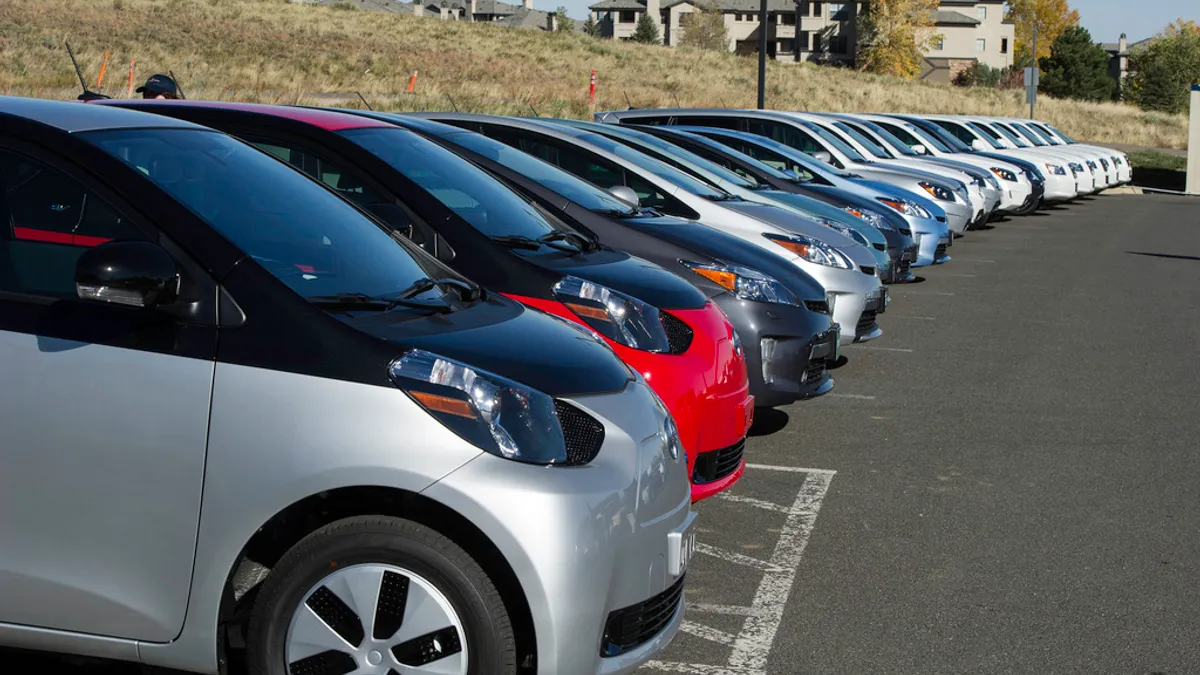Dive Brief:
- A new analysis from Illinois consumer advocate group Citizens Utility Board (CUB) concludes Ameren customers with an electric vehicle (EV) could reduce annual charging costs by about 50% through the utility's Power Smart Pricing rate.
- The dynamic rate offering is based on day-ahead prices in the Midcontinent ISO, and is open to all of Ameren's residential customers. CUB's analysis shows potential savings may be most significant for EV owners.
- The report examined 2018 rates and concluded potential savings for EV owners ranged from $31 to $220 in that year, compared with paying the utility's traditional electric prices. According to the utility, more than 13,000 customers have signed up for the Power Smart Pricing (PSP) program and so far they have saved more than $12 million.
Dive Insight:
The specifics of CUB's analysis indicate that most customers would likely not realize all of their potential savings, but the group says the study makes a strong argument for opt-out rates for EV owners.
"With the aid of the sophisticated sensor and data-analysis capabilities prevalent in vehicle charging technology, utilities could isolate EV-related consumption, making a separate opt-out policy feasible," the report concludes.
The analysis used actual 2018 MISO locational marginal prices to compare what "perfectly rational EV drivers" would pay to charge their vehicle on Ameren’s Power Smart Pricing program.
"Electricity customers are hungry for good choices in the market, and Power Smart Pricing is one of the best, whether you drive an EV or not," CUB Executive Director David Kolata said in a statement.
The advocacy group is currently lobbying Illinois lawmakers to pass the Clean Energy Jobs Act, which includes an electrification provision to encourage off-peak EV charging. Kolata says the bill would help to "make sure the grid is prepared for the rise of EVs," by connecting drivers to pricing programs like Ameren's.
Ameren says it estimates about 3,400 electric vehicles are owned in its service territory.
"Most customers tell us that they are satisfied with the program," an Ameren spokesperson said in an email. "We expect PSP enrollments to grow as customers acquire more in-home devices that enable them to manage and track their usage."
CUB's analysis of the program's potential for EV drivers included three "representative" EVs: the 2018 Toyota Prius Prime, the 2018 Chevy Bolt and the Tesla 3 Long-Range. Researchers say they also used "off -the-shelf representative Level 2 and Level 3 chargers to estimate the maximum achievable charge rate."
CUB calculated what EV drivers would pay to charge their car on Ameren’s flat-rate energy tariff to meet their daily driving needs, and compared that to the lowest-available rates on the PSP program.
Ameren’s dynamic pricing program "would have saved EV owners significantly over its flat-rate tariff in 2018," with cost reductions from 50% to 51%, equaling as much as $220 over the study period, the CUB found.
The group says programs like Ameren's PSP help reduce peak electricity demand, which "eases stress on the grid, helping to prevent costly power outages. It also avoids the need to fire up expensive 'peaker' power plants, cutting pollution and lowering electricity costs for everyone."
There are more than 1 million EVs owned in the United States, but that figure is expected to increase sharply in coming years. According to the Edison Electric Institute, a jump in sales over the next decade could mean 19 million emissions-free vehicles on U.S. roads by 2030.
Correction: Since Utility Dive's Feb. 11 story on the potential savings to Ameren electric vehicle drivers enrolled in the utility's Power Smart Pricing program, Citizens Utility Board has reissued its report due to errors in the analysis. CUB says it used the incorrect locational marginal prices in its report, causing potential savings to be revised downward by a significant margin.
The group's corrected analysis finds Ameren’s Power Smart Pricing program could have saved EV owners about 50%, equaling $31 to $220 over the 2018 study period.















